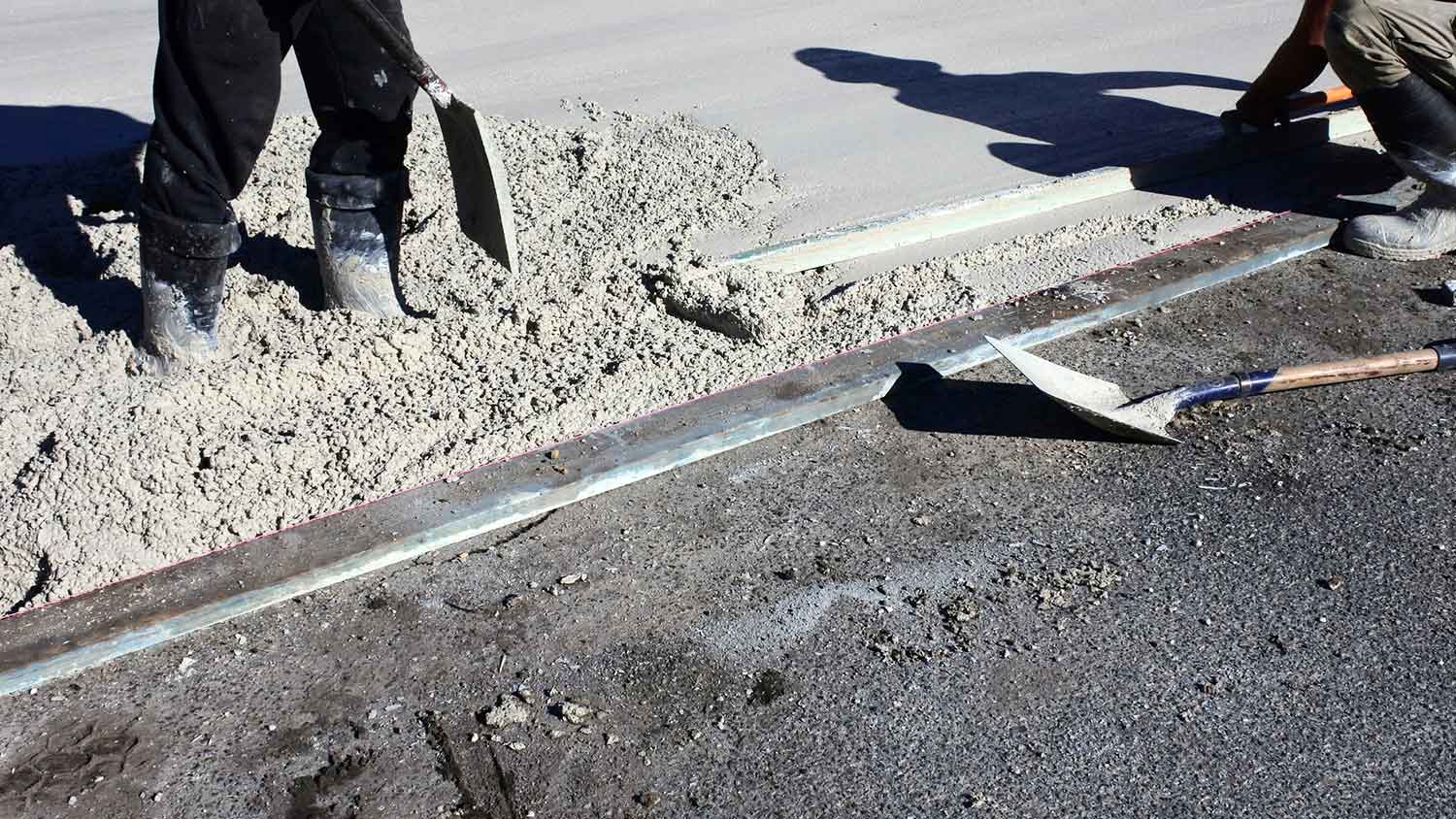Can You Pour Concrete Over Asphalt?
An affordable solution or a recipe for disaster?


It’s possible to pour concrete directly over asphalt, but you need to prepare the asphalt first to ensure proper bonding.
Concrete lasts longer than asphalt and is more affordable, so it’s a high-value upgrade.
If you have drainage issues with your asphalt driveway, you should consider a full replacement, as these will lead to fast degradation of the concrete.
Considering replacing your asphalt driveway with a longer-lasting concrete one? If you want to avoid tearing up your existing driveway, you can pour concrete over asphalt. However, there are a few important things to consider before you get started. In this guide, we’ll discuss everything you need to know and the process for refacing your asphalt driveway with concrete.
Can You Pour Concrete Over Asphalt?
Yes, you can pour concrete over asphalt, but the two materials won’t bond well together naturally. You’ll need to carry out some surface preparation before you build your concrete molds and start pouring. In some cases, you can get away with milling the asphalt to create more surface area for the concrete to adhere to and then add a bonding agent. Installing rebar to hold the concrete in place is a better option and can also preemptively address minor drainage issues that would otherwise lead to a limited concrete driveway lifespan.
How to Pour Concrete Over Asphalt
To ensure you get good bonding between the two materials, make sure you follow the steps below.
1. Repair and Level the Asphalt
First and foremost, you should make sure the asphalt surface is clean, in relatively good condition, and level. If the asphalt is in decent condition, you can power wash it and remove any loose grit with a deck broom. If there’s major surface damage or the asphalt is unlevel, you should have a professional mill it level for you. You may also be able to rent a milling machine from your local home improvement store.
2. Create a Better Chance of Bonding
Once the surface is clean and level, you need to ensure the concrete will bond to the asphalt. If you did heavy milling to level your asphalt, you could just add a bonding solution for asphalt-to-concrete adhesion and then move on.
For the best results, though, drill holes down into the asphalt and place rebar into them, leaving two to three inches of rebar protruding above the surface, depending on how thick your driveway needs to be. Space the holes 12 to 18 inches apart in a grid pattern. Regardless of the type of concrete you pour, it will adhere well to the rebar, keeping the new slab secured in place. The holes will also improve drainage through the asphalt to prevent cracking on your new driveway.
3. Build Your Concrete Form
Next, you can build the form for your concrete. You can use 2-by-4-inch or 2-by-6-inch material to build the forms around your asphalt driveway. Check for square at the corners before you proceed. You should also create a web of rebar throughout the area where your slab will sit for added reinforcement.
4. Pour and Level Your Concrete

Finally, it’s time to pour your concrete. You can either rent a concrete mixer or hire a concrete contractor to deliver it to save time and energy. Level the concrete using screed boards, and then finish the surface with a trowel, broom, or another concrete finishing tool.
Pros and Cons of Pouring Concrete Over Asphalt
Pouring concrete over asphalt comes with some upsides and drawbacks, and you should really consider all of these before deciding if this is how you want to upgrade your driveway.
Pros
More affordable than the cost of a new concrete driveway
Creates a surface with a longer lifespan than asphalt
Quick project that has a big impact on curb appeal
The job is DIYable if you have access to rental tools
Cons
Risk of concrete cracking prematurely due to drainage issues
Poor bonding between materials requires a lot of prep work
Concrete over asphalt won’t last as long as a standalone concrete slab
How Much Does It Cost to Pour Concrete Over Asphalt?
It costs an average of $1,200 to hire a concrete driveway company near you to pour concrete over asphalt for a single-car driveway. For a two-car driveway, you’re looking at a total of $2,500. The cost per square foot averages $6 and ranges from $4 to $12.
Frequently Asked Questions
An asphalt overlay or top coat costs between $3 and $7 per square foot. For a standard, single-car driveway that’s 10 feet wide and 20 feet long, that’s a total of between $600 and $1,400. For a two-car driveway, you’re looking at a total of between $1,200 and $3,000.
Asphalt can get sticky in high temperatures and intense sunlight and is better for cooler or moderate climates, while concrete is more likely to crack in colder climates where water can seep into the slab and freeze. Asphalt requires more maintenance in terms of sealing, it has a slightly shorter lifespan, on average, and it’s a bit more expensive to install. Concrete will last longer with less maintenance, and it offers you more options for customization, including staining and stamped patterns. As such, a concrete driveway adds to home value more than an asphalt driveway in many cases.















